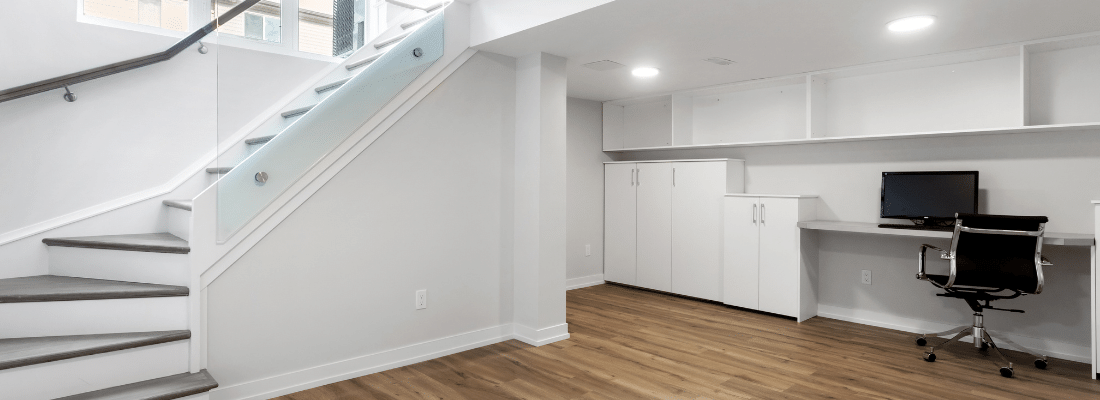It is far from unusual to have moisture in a basement, and homeowners should take steps to control it as much as possible. Even if the basement is unused, excessive moisture levels can turn into a big headache for both the structure itself and its occupants.
But how can you tell if you have a moisture problem? The air in the space might feel damp or humid, or you may have an accumulation of condensation on the floor or the walls. Sometimes, you may even have water trickling out of the walls or standing water on the floor. Where any wood is exposed, expect to see rotting and a pervasive odor of mold or mildew.
Sources of Basement Moisture
Basement moisture will typically come from one of several sources.
-
Water Table: If you live in a part of the country with very changeable weather conditions, the water table beneath your property may be quite high. This can lead to the threat of water penetration, as can improper grading around your property. If the soil slopes backward toward your home rather than away, you should seek modifications. Also, are your downspouts and gutters correctly configured? Fit extensions if need be so that the water is directed a long way away from your foundation.
-
Ventilation: Sometimes, ventilation methods are inadequate, and the humid outside air may become trapped in this dark, enclosed space. It'll condense on the floor and walls to compound any other moisture threat.
-
Leakage: Lastly, it's important to check for any potential interior moisture sources. There could be a water leak somewhere from a hidden pipe.
Why Is It Difficult to Choose Basement Flooring?
When moisture is a big threat, it can be difficult to choose waterproof basement flooring. After all, when the subfloor is too wet, the covering is likely to show imperfections, and it may be particularly difficult to install. The less moisture-resistant the flooring type, the more susceptible it will be to damage. And don't forget, some flooring types may be fully waterproof, but others may be water-resistant, so bear that in mind when planning your project.
Sealed Concrete Base
If you want to turn your basement into an attractive, comfortable, and liveable space, pay close attention to your flooring choice. It's often best to start with a fully waterproof option such as sealed concrete to provide a solid base before adding a more attractive treatment on top. Concrete is relatively inexpensive but very durable, and it's easy to install and versatile. It needs to be placed on a level base covered with sand to the most appropriate depth (based on your usage requirement) and correctly cured.
Once the concrete has been left for several days, you will need to seal it. Otherwise, tiny particles of moisture may rise to the surface as the concrete cures, and moisture in the ground beneath can also permeate through tiny fissures. This is not a good idea if you plan to add a flooring layer on top, as it can lead to issues with mold, mildew, and rot. To minimize this threat, make sure the sealant is applied with either a roller or sprayer, covering the entire area comprehensively.
Depending on the inherent humidity levels, the sealing treatment may take a couple of days to dry. Usually, the best types of sealer include polyurethane, acrylic, or epoxy, and many options are commercially available. Perhaps the best solution is a deep-penetrating concrete sealer that can prevent the movement of both moisture and gas through the concrete in both directions.
Checking the Moisture Content
Before you move ahead to install an additional basement flooring level, you can check the moisture content of the finished slab. Some people choose to lay down a plastic sheet on top of the concrete for several days before reading the humidity level beneath the sheet using a hygrometer. Alternatively, a moisture meter probe can be inserted into a small hole drilled within the slab. This will provide additional information about the relative humidity levels found inside the slab.
Best Basement Flooring Options
Once you are happy with your concrete floor installation, you can choose options that will sit on top. So, what is the best flooring for a basement cement floor?
Luxury Vinyl for Basements
Luxury vinyl plank flooring will look great and make your newly renovated space elegant. These vinyl planks are made from stone plastic composite and take on the appearance of natural wood. This flooring option is scratch-resistant, great for residential use, and can be installed directly on top of the subfloor. In addition, these planks are water-resistant, as they have a central core that is designed to repel any moisture from below. They are also made from 100% polymer materials and will generally have higher water resistance levels than other options, such as laminate. These polymer materials are resistant to mildew or mold.
Furthermore, vinyl basement flooring is quite easy to install, especially if you bring in a professional installer at the outset. They will help install this basement flooring option over a concrete base so that you can transform your space into a liveable and workable solution.
Vinyl Vs Laminate
By the way, vinyl is typically better than laminate as the latter option is not very water-resistant. High humidity levels or the presence of any moisture could cause buckling and separation or the development of mold and mildew.
Engineered Hardwood
Engineered hardwood is another popular option. You'll find a range of solutions, but all of them will look outstanding, last a long time, and be very versatile. This type of hardwood is made up of several layers of plywood finished with a solid hardwood layer on top. However, be careful when choosing your option, as its overall efficiency will largely depend on its construction.
A three-layered construction approach is best, with each layer positioned to prevent cupping, bowing, or warping that can often occur when there is any moisture in the environment. Consequently, this type of engineered hardwood solution will be best for your basement application. Also, it will be relatively easy to take care of and is certainly low-maintenance.
No matter what type of activity you plan in your basement, engineered wood will coordinate perfectly well. It will add character and comes in a variety of different colors, so you shouldn't find any issue matching your taste and decor style.
Transforming Your Basement Space With Southern Luxe Flooring
As you can see, you can transform your basement space even if you have some existing moisture problems down there. Understand the source of the moisture and, if possible, minimize it before adding a fully waterproof concrete base. Next, seal the concrete and allow everything to cure before adding a high-quality, attractive floor on top.
The Southern Luxe Flooring Collection has some great options when it comes to engineered hardwood or luxury vinyl plank flooring. If you need more basement flooring ideas, get in touch to request a sample or talk with the experts if you are ready to start your own project.
 NATIONWIDE SHIPPING AVAILABLE!
NATIONWIDE SHIPPING AVAILABLE!





.webp?width=762&height=464&name=design-room%20(2).webp)







